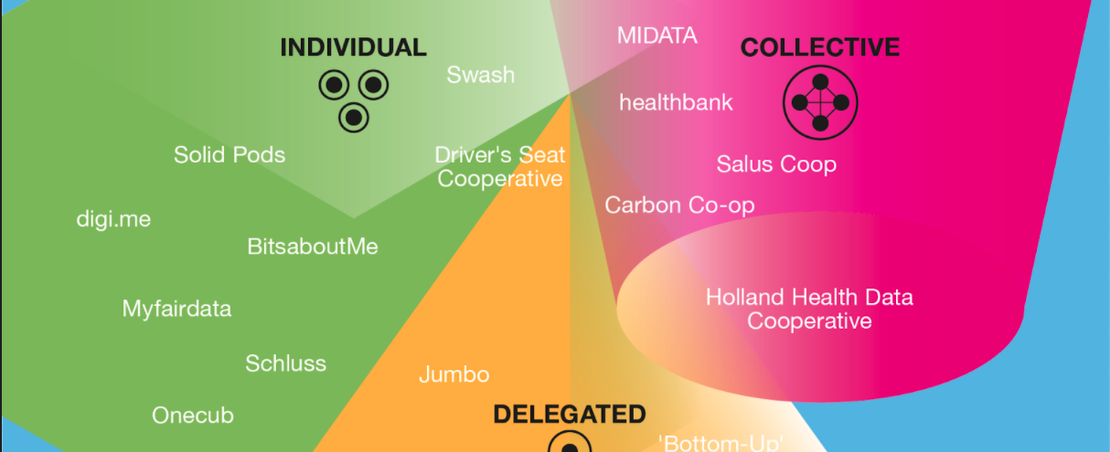
In August 2021, we launched a call for proposals to help us better understand public perceptions of data stewardship and ‘bottom-up data institutions’. We are now pleased to announce that we will be working with Projects by IF to conduct this important research.
At the Open Data Institute (ODI), we’re interested in data institutions – organisations that steward data on behalf of others often towards public, educational or charitable aims. We think data institutions have a vital role to play in ensuring that data is used to create essential new technologies, products and services, as well as limiting the harm that misuses of data can cause people and communities.
What are bottom-up data institutions?
We’ve come across a number of data institutions that are trying to empower people – usually those who have generated the data or whom the data is about – to play a more active role in controlling how that data is used or shared.
We refer to these as bottom-up data institutions, as they focus on addressing the power imbalance in the data economy between corporations and individuals. They come in different shapes and sizes, and describe themselves in different ways – terms being used in this field include ‘data intermediaries’, ‘data cooperatives’, ‘data unions’, ‘personal data stores’, ‘data lockers’, ‘data trusts’ and many more.
Some examples include MIDATA, which enables citizens to collect their health data and to make decisions about its use in research projects, and Driver’s Seat, which helps gig economy drivers to pool data about them to understand and optimise their working hours.
Why do we care about the public's perception of bottom-up data institutions?
There is significant interest and experimentation in these approaches among policymakers and technologists. But we have seen few attempts to understand how the general public – in many cases the intended users and beneficiaries of these data institutions – feel about them. We want to begin to address that.
Public perceptions of data and technology more generally have been fairly well documented in the past through large-scale quantitative surveys. For example, previous ODI research has shown that young people are more comfortable with sharing data than older members of the public, and Doteveryone found there to be disempowerment and distrust in the data economy in its current form.
But in regards to public perceptions about data stewardship more specifically, there has been very little research outside of the health sector. One quantitative study found that members of the public were dissatisfied with the current status quo and wanted to see new approaches to data sharing that increase levels of control over data about them. But there has been little work to understand the public's perception of data stewardship through a qualitative lens.
What are we going to do?
After a tendering process started in August, we’re really pleased to announce that we’ll be working with Projects by IF to understand how members of the public perceive data stewardship and different types of bottom-up data institutions.
This research will build upon some ODI thinking around different decision-making mechanisms. Different forms of decision-making enable different levels of participation and control over data – this framework sets out three types of decision-making which this project will explore: individual, collective and delegated. We will use this framework, alongside the recently published ‘Participatory data stewardship report’ by the Ada Lovelace Institute, to shape our research.
Given that knowledge of these frameworks is currently quite limited, this research will borrow from the deliberative method in combining in-session education with facilitated discussion. As with previous collaborations with IF, we'll use their approach to design to translate technical ideas in ways the public can understand.
The research will be split into three phases:
- Creating educational materials that communicate the underlying concepts of data stewardship and bottom-up data institutions in a way that enables research participants (and the general public more widely) to understand, discuss and evaluate the various approaches.
- Organising and conducting a focus group with members of the public. The session will be used to explore this user group’s current understanding of and interest in data stewardship, including how they conceptualise it and their attitudes towards it. After introduction to the various concepts, the group will be left to collectively exchange and discuss their viewpoints on the options presented.
- Producing a creative report to communicate the findings of the research, including visual components, key learnings and quotes from the participants.
The research will seek to understand:
- What does this user group know about data stewardship, and how do they understand data about them to be collected, used and shared?
- Is this user group interested in being more empowered and involved in stewarding data about them? To what extent do bottom-up data institutions appeal to them? What might persuade this user group to engage with them?
- What differences does this user group see when presented with different types of bottom-up data institutions? Do they prefer one over another? What is it about each that is most interesting?
Through this process we also hope to improve how we speak at the ODI about data stewardship and data institutions, to ensure that our work is as accessible as possible.
If you are interested in taking part in this research, or would like to share any information or resources with the team, please send us an email at [email protected].